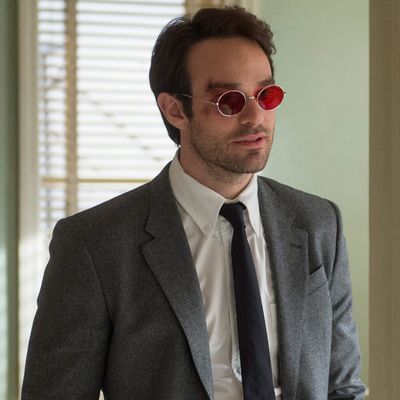
Let’s talk about punches. Not the sherbet-and-ginger-ale kind you get after a piano recital, but the fist-on-flesh kind you get in a fight, or as a neighborhood vigilante. So many punches in Daredevil, and each frequently remarked upon. See, Matt Murdock — lawyer by day, superhero by night, blind guy by all the time — can take a licking, which he learned from his dad, who was a so-so amateur boxer. My dad could take a punch, Matt tells us and anyone else who will listen, including a priest and an underdeveloped love interest. Maybe punch-taking is genetic? Perhaps it’s a nurture trait, not a nature trait, but either way: Daredevil thrives on your punches, you gnarly cretins! The thing he cannot take is injustice. Don’t think about the instances in which punching is a crime. Just let Matt/Daredevil tell you more about punches. “It hurts, doesn’t it? Being in pain?” That’s what Daredevil says to a bad guy. Bring on the tautologies, Daredevil. Pain is hurt, hurt is pain. Is life one giant punch to all of us? Maybe so.
Daredevil is Netflix’s latest original series, and it isn’t all that original: It’s another Marvel property, joining ABC’s Agents of S.H.I.E.L.D. and Agent Carter and what feels like dozens of films. Daredevil is also a half-assed lawyer show, complete with a drawn-out organized crime case and a blonde assistant who herself is embroiled in said case. The good guys are good, the bad guys are bad, and of course the women are there to be victims and helpers and occasionally both a victim and a helper. The show is squarely violent, including the aforementioned punches and lots of severe beatings (a particularly disturbing one with a bowling ball), the severing of limbs, and plenty of cracking bones. If you like hand-to-hand fight scenes, Daredevil has your number. It’s almost a relief not to have everything be guns, guns, guns, and these sometimes-brutal action sequences emphasize how much Daredevil cares about bodies: Where are we strong, where are we weak, what can be zeroed in on? The chemicals that blinded Matt as a child also gave him heightened abilities in his other senses — a premise the show handles well and delicately, making his powers of observation seem more like the setup for a USA spinoff of Psych than a moody superhero drama.
But is it a Netflix show? The idea of “a Netflix show” is one of prestige and binge-worthiness, of the kind of daring programming a network would be too chicken-shit to try and cable would be too slow to capitalize on. Netflix winds up being the vehicle for how many of us consume “quality” television, particularly shows we’ve waited for and heard about over the course of months or years — and that winds up contributing to the idea of “a Netflix show.” Netflix has two bona-fide gems in Orange Is the New Black and Bojack Horseman: smart and original, funny, and precise. But the rest of its original programming isn’t all that striking. Lilyhammer originated in Norway and is not very good. House of Cards has some high dramatic highs, but its feebly constructed lows are too ridiculous to ignore. Hemlock Grove is awful. Bloodline is a story drought, with no emotional relevance and very little to say. Marco Polo? Yeesh. Netflix revived The Killing. The Killing! Boy, that show did not need a season four. (Or … three or two.) Even if we chalk up its creative failures to non-Netflix entities, Netflix still decided to wring a fourth season out of it. Many people enjoyed season four of Arrested Development, though I am not one of them (curse you, bad green-screens), but even so: AD is Fox’s more than it’s Netflix’s. Unbreakable Kimmy Schmidt is great, but that was made for NBC.
And so maybe Daredevil is a real Netflix-y Netflix show in that it’s competently assembled but ultimately sort of hollow. It is indeed a fine companion piece to Bloodline or Marco Polo, which is not much of a distinction. Charlie Cox is appropriately ponderous as our hero, but the show tries to get silly with his law partner and bestie Foggy Nelson (Elden Henson) … except the tone doesn’t fully shift in these moments. So while Henson is frantically trying to play up jokes (OMG, it is sooooo embarrassing to sing Pirates of Penzance to yourself!), nothing quite lands. Deborah Ann Woll brought depth and vulnerability to her work on True Blood, and she’s so underused here as Karen, Matt and Foggy’s co-worker/client. Even more underused is Rosario Dawson as Claire Temple, a doctor — a lady doctor — who patches Matt up while the two slowly fall for each other. Vincent D’Onofrio glurgles his way through his villain role as Kingpin, ultimately seeming like the only person having any fun.
As stand-alone episodes, plenty of Daredevil works, and were it a week-to-week traditional series, maybe the repetitiveness would be less bothersome. In a marathon session, you get clobbered with the same ideas and images over and over and over, so I’d encourage would-be fans to dole out episodes no more than two at a time. That’s probably not the true Netflix way, but then, the true Netflix way isn’t all that wonderful.

